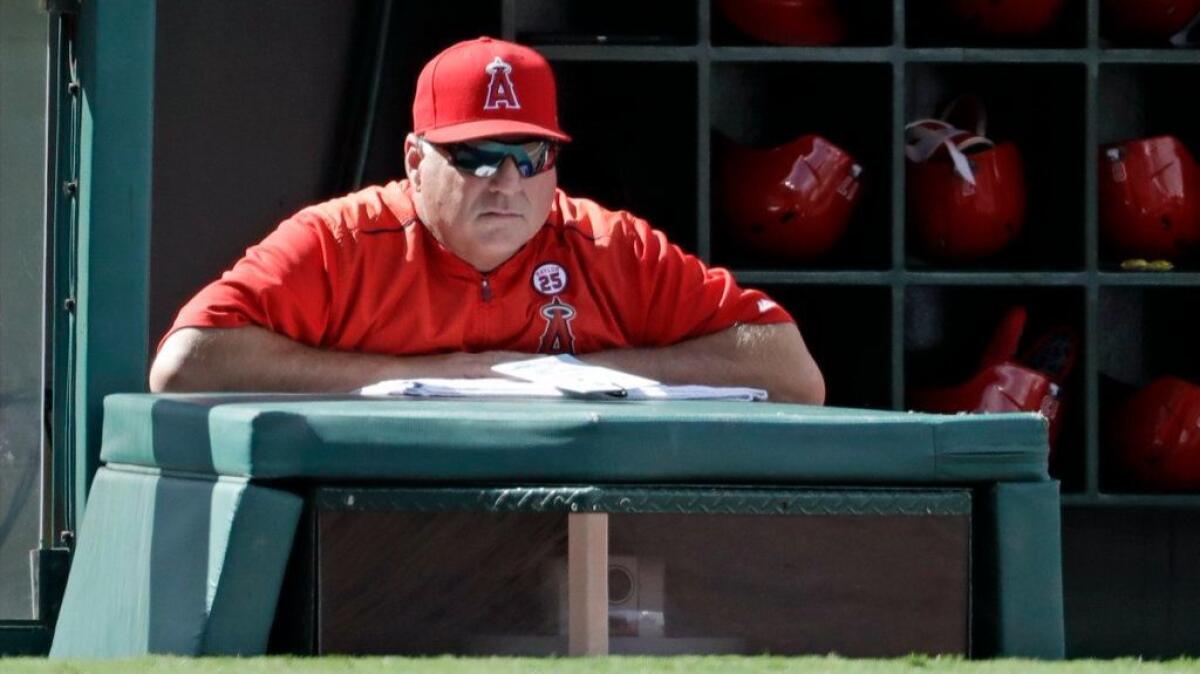Scioscia, set to return for 19th season as Angels manager, is optimistic it will be a good one

- Share via
The second-longest-tenured head coach or manager in American professional sports will be back next year.
Mike Scioscia said Monday that he would return in 2018 for his 19th season as Angels manager, his first as a lame duck since 2001. His 10-year, $50-million contract, signed in January 2009, expires after the season.
On Sunday, the Angels finished their season five games out of a spot in Tuesday’s American League wild-card game. Their 80-82 record resulted in the first back-to-back losing seasons in Scioscia’s tenure.
Scioscia said Monday that he would not come back unless he thought general manager Billy Eppler and owner Arte Moreno believed in his abilities. He added that he would “absolutely” be comfortable managing with an expiring contract.
“Right now,” he said, “I’m focused on 2018 because I think we have a lot of momentum and potential that we see. I know we’re gonna be better next year, and that’s what I’m excited about.”
Eppler, too, stressed a short-term perspective. “We’re not focused on ’19, we’re focused on ’18,” he said. “That’s solely where our whole mindset is right now. He’s comfortable with that. I’m comfortable with that. Arte’s comfortable with that. That’s it.”
Asked how he thought he performed in 2017, Scioscia said he was not yet ready to revisit it.
“I can only tell you that I am extremely disappointed that we didn’t get there, because I really had a lot of confidence in the guys,” he said. “They played hard, but we just didn’t quite get there.”
The 2016 Angels were 74-88, their worst record under Scioscia. The day after the season, he declared that the team was closer to reversing that record than repeating it. One year later, he struck a similar tone.
“The difference from where we’re at 80 wins to 90 wins, I don’t believe that gap is as big as it was last year when we were talking about this,” Scioscia said. “We’re very, very optimistic and excited about what we hope to be talking about next year at this time.”
Eppler nodded as Scioscia spoke.
“You’re always optimistic when you’re dealing with health things,” Eppler said. “I don’t look at it as some kind of blind optimism, like we’re closing our eyes and blowing out candles on a birthday cake, thinking, ‘Let’s get better.’ It’s more than that.”
He cited the projected health of the team’s pitching depth as evidence. He thinks the Angels have seven or eight starting pitchers who will be sound next spring, though only three finished the season in the rotation.
Eppler said he hoped to extract at least 600 innings from the five who begin 2018 in the Angels’ rotation. This year, the Angels’ projected top five totaled 509 1/3.
On offense, the biggest decision will not be the Angels’ to make. Left fielder Justin Upton must inform the team within three days after the World Series if he will opt out of the four years and $88.5 million remaining on his contract.
Eppler said he and his staff would develop two off-season plans.
“You have a plan with the player here, you have a plan with the player not here,” Eppler said. “It’s pretty easy to execute either one as soon as you know.”
The Angels’ 2016 and 2017 opening-day payrolls were about $165 million, right around the one-third chunk of annual revenue that is standard across the sport.
Eppler and Moreno have never publicly commented on the budget, but there’s no reason to believe the investment strategy would change. If Upton stays, the Angels would have more than $110 million tied up in six returning players. At least $25 million is earmarked for the team’s 11 arbitration-eligible players. After minimum-salaried players are counted, that leaves about $25 million to spend on free agents or trade acquisitions.
Eppler said his focus would be to improve the team’s on-base percentage. He wants it to be no lower than .330.
The Angels’ 2017 mark was .315, fifth-worst in the American League. Their slugging percentage of .397 was the league’s worst. But Eppler’s offensive philosophy is built around selectivity.
“The metric that has the strongest correlation to run scoring,” he said, “is on-base percentage.”
Follow Pedro Moura on Twitter @pedromoura
More to Read
Go beyond the scoreboard
Get the latest on L.A.'s teams in the daily Sports Report newsletter.
You may occasionally receive promotional content from the Los Angeles Times.







